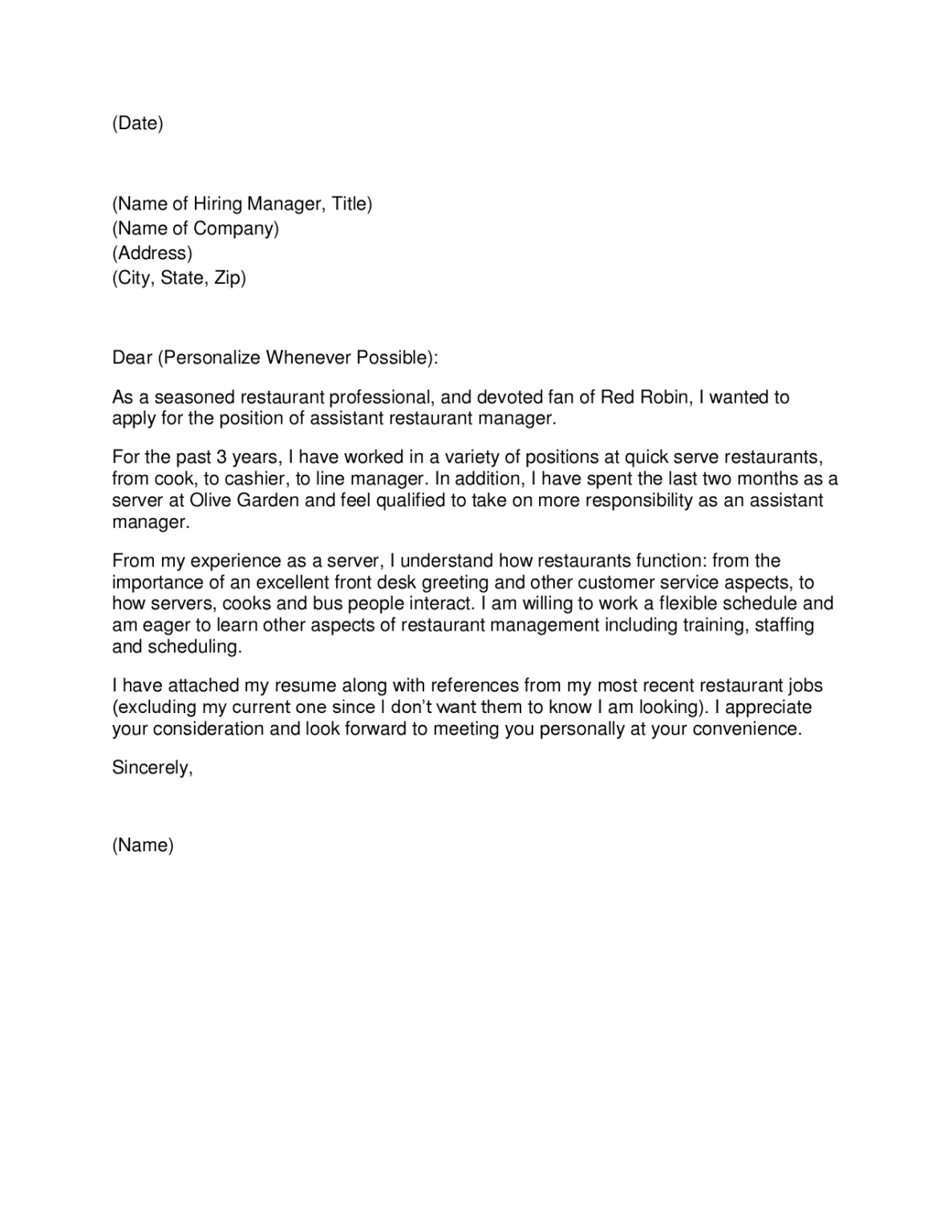Restaurant Manager Cover Letter How-To Guide
A well-crafted cover letter is your first opportunity to make a strong impression on a potential employer. For restaurant managers, this is especially important because the industry is competitive. Your cover letter is not just a formality; it’s a marketing tool that showcases your skills, experience, and enthusiasm. This guide will help you create a compelling cover letter that captures the attention of hiring managers and increases your chances of landing an interview. By following these guidelines, you can demonstrate your suitability for the role and make a lasting impact.
Understanding the Purpose of a Cover Letter
The primary purpose of a cover letter is to introduce you and your qualifications to the hiring manager. It provides context to your resume, explaining how your skills and experiences align with the specific requirements of the restaurant manager position. Think of it as a narrative that complements your resume, painting a picture of your professional journey and aspirations. A well-written cover letter goes beyond simply listing your responsibilities; it demonstrates your understanding of the restaurant industry, your passion for hospitality, and your ability to contribute to the restaurant’s success. It’s your chance to make a personalized connection and express your genuine interest in the opportunity.
Highlighting Your Relevant Skills and Experience
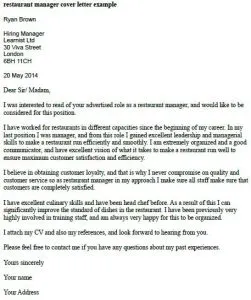
When writing your cover letter, focus on highlighting the skills and experiences that are most relevant to the restaurant manager role. Consider the specific requirements mentioned in the job description and tailor your letter to address them. Mention specific accomplishments and quantify your achievements whenever possible. For example, instead of saying ‘Managed a team of employees,’ you could say, ‘Managed a team of 30 employees, increasing team efficiency by 15% and reducing employee turnover by 10%.’ This provides concrete evidence of your abilities. Key skills to emphasize include leadership, team management, financial acumen, customer service, and problem-solving. Showcase your ability to motivate a team, manage budgets, handle customer complaints, and ensure smooth restaurant operations. Demonstrating these skills effectively can set you apart from other candidates.
Tailoring Your Cover Letter to the Specific Restaurant
Generic cover letters are often overlooked. To stand out, personalize your cover letter for each restaurant you apply to. Research the restaurant – its menu, concept, target audience, and values. Show that you understand their unique offerings and business model. In your letter, mention specific aspects of the restaurant that appeal to you and explain how your skills can contribute to their success. This shows that you’ve taken the time to learn about the company and are genuinely interested in joining their team. Tailoring your letter demonstrates attention to detail and a proactive approach, both of which are highly valued in the restaurant industry. Mentioning their specials or highlighting what you know about the restaurant shows you care.
Restaurant Manager Cover Letter: Key Elements
Contact Information and Date
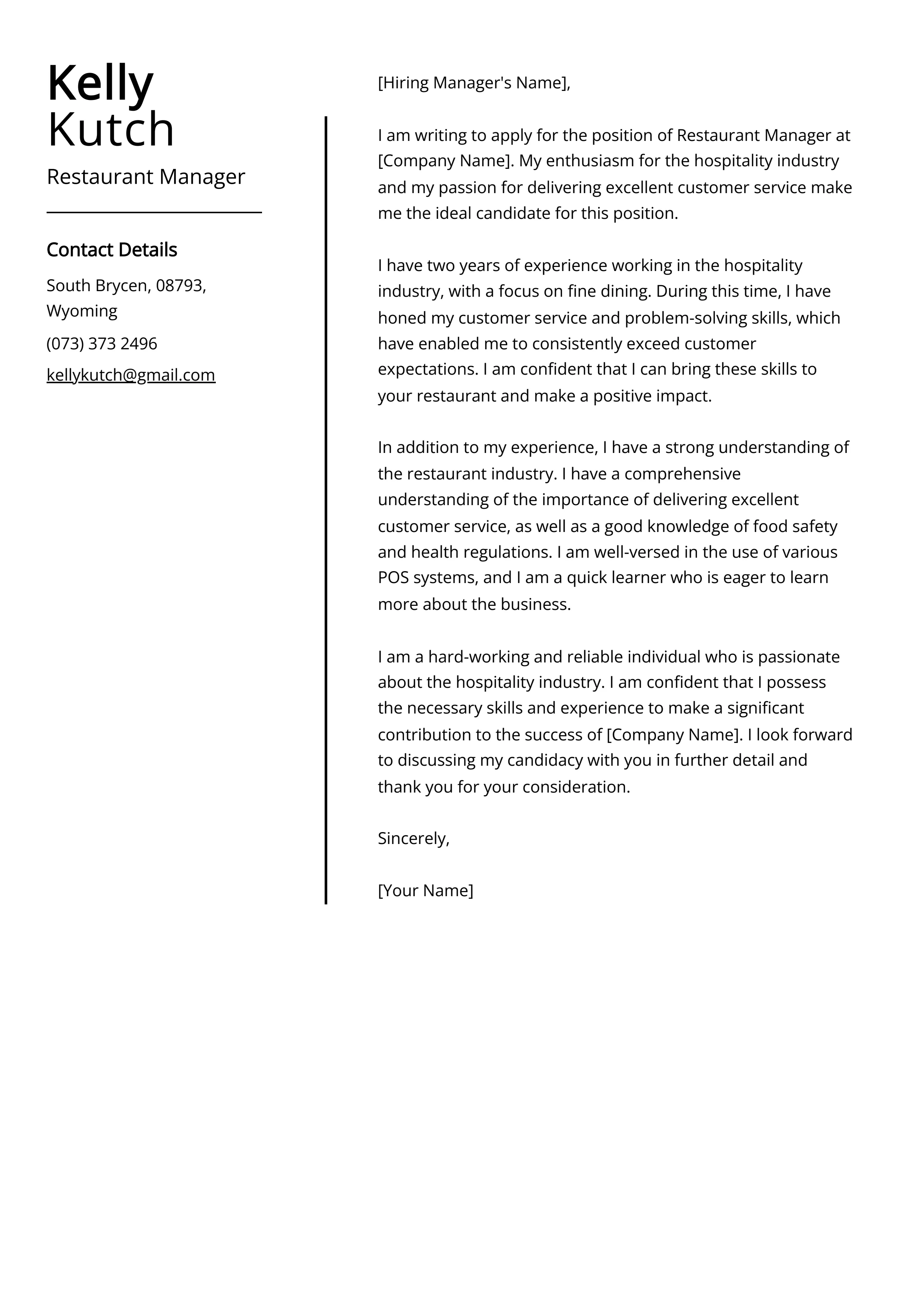
Begin your cover letter with your contact information, including your full name, phone number, email address, and LinkedIn profile URL (if applicable). Include the date below your contact information. This section is essential for the hiring manager to easily reach you. Ensure your contact information is accurate and professional. Double-check your email address for any typos and ensure your voicemail is set up with a professional greeting. Use a clean and easy-to-read format to make sure your contact details are readily accessible and visually appealing.
Greeting and Addressing the Hiring Manager
Always address your cover letter to a specific person whenever possible. If the job posting lists a hiring manager’s name, use it. If not, research the company to find the name of the person responsible for hiring. Addressing the hiring manager by name shows that you’ve put in the effort to personalize your application and makes a better impression than using a generic greeting like ‘To Whom It May Concern.’ If you are unable to find a name, a suitable alternative is ‘Dear Hiring Manager’. Avoid informal greetings, like ‘Hello’, or ‘Hi’, and use a professional salutation.
Opening Paragraph
Your opening paragraph is your first opportunity to grab the hiring manager’s attention. Clearly state the position you are applying for and how you found the job. Express your enthusiasm for the opportunity and the restaurant itself. Briefly mention your most relevant qualifications or skills to pique their interest. This paragraph should be concise and engaging, setting the tone for the rest of the letter. Avoid generic opening statements; instead, make it clear why you are a strong candidate and how you are excited to contribute to the restaurant’s success. This initial statement must make an impact and get the reader interested in your profile.
Highlighting Achievements and Quantifiable Results
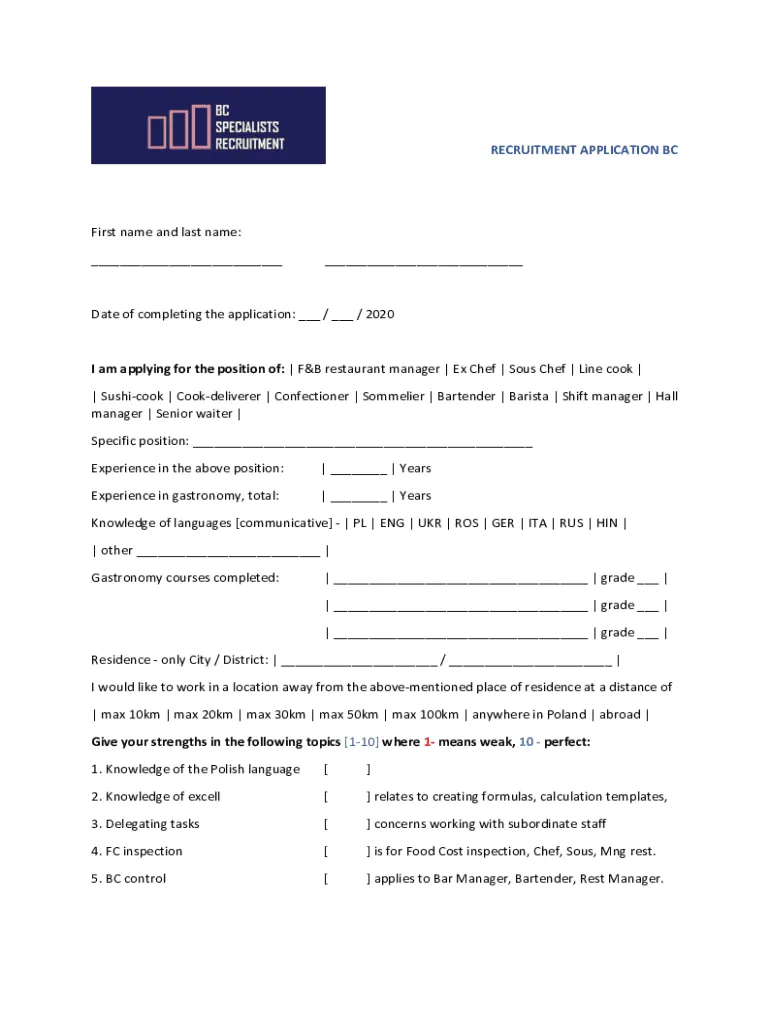
Focus on your achievements and the quantifiable results you’ve delivered in previous roles. Use action verbs and provide specific examples to demonstrate your capabilities. Instead of simply stating that you ‘improved customer service’, describe how you ‘implemented a new training program that increased customer satisfaction scores by 20%.’ Whenever possible, use numbers to quantify your achievements, such as ‘increased revenue by 15%’ or ‘reduced food costs by 10%.’ This makes your accomplishments more credible and impactful. This evidence is crucial to proving you are the best applicant. The more data you can include, the better.
Demonstrating Restaurant Knowledge and Skills
Showcase your comprehensive knowledge of the restaurant industry and the specific skills required for a restaurant manager position. Highlight your experience in areas such as staff management, inventory control, budgeting, and customer service. Mention your familiarity with point-of-sale (POS) systems, food safety regulations, and other relevant software or technologies. Demonstrate your ability to handle the challenges of the role, such as managing staff, resolving customer complaints, and ensuring smooth operations. The more relevant skills you include, the better the chances of landing the job. Your skills and knowledge are the backbone of your abilities.
Closing Paragraph and Call to Action
In your closing paragraph, reiterate your interest in the position and express your enthusiasm for the opportunity. Thank the hiring manager for their time and consideration. Include a call to action, such as ‘I am eager to discuss my qualifications further in an interview’ or ‘I am available for an interview at your earliest convenience.’ Provide your contact information again for easy reference. Keep the closing paragraph concise, professional, and leave a positive lasting impression, and make it easy to take the next step.
Restaurant Manager Cover Letter: Formatting Tips
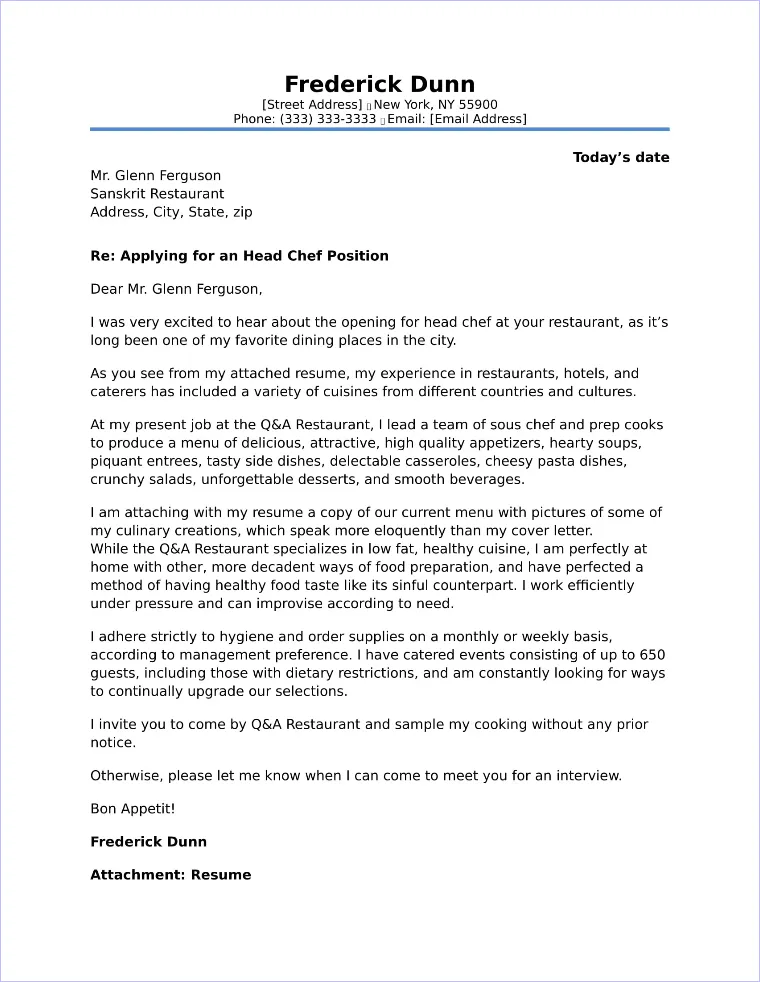
Choosing the Right Font and Formatting
Choose a professional and easy-to-read font, such as Times New Roman, Arial, or Calibri, with a font size of 11 or 12 points. Use a standard font for all your cover letters, so the application is consistent. Maintain consistent formatting throughout your cover letter, including spacing and alignment. Use single-spacing within paragraphs and double-spacing between paragraphs. Use left alignment, and avoid excessive use of bolding or italics. Ensure your cover letter is visually appealing and easy to read. A clean and well-formatted cover letter shows attention to detail.
Maintaining a Professional Tone
Maintain a professional and respectful tone throughout your cover letter. Use formal language and avoid slang or casual expressions. Proofread your letter carefully to eliminate any grammatical errors or typos, and ensure your sentences are concise and clear. Be positive and enthusiastic about the opportunity, but avoid exaggerating your skills or achievements. Focus on what you can offer the restaurant and how you can contribute to their success. Professionalism is a key aspect for an effective cover letter.
Proofreading and Editing Your Cover Letter
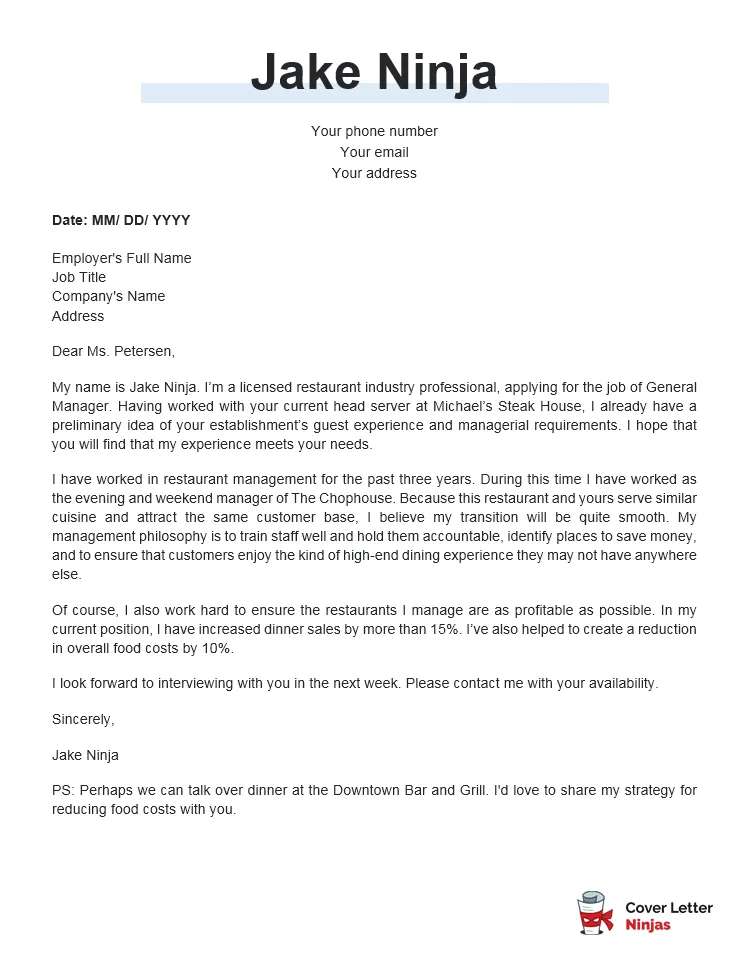
Before submitting your cover letter, thoroughly proofread and edit it to catch any errors. Check for grammatical mistakes, typos, and formatting inconsistencies. Ask a friend or family member to review your letter for clarity and accuracy. Consider using grammar-checking tools to identify any potential issues. A polished and error-free cover letter demonstrates your attention to detail and professionalism. Take the time to ensure that your cover letter is perfect before sending it. It’s the final piece of your cover letter, and a bad one could mean the difference between a job or not.
Restaurant Manager Cover Letter Example Template
While the specific content of your cover letter will depend on the job and your background, the following template provides a general framework:
[Your Name] [Your Address] [Your Phone Number] [Your Email Address]
[Date]
[Hiring Manager Name] [Hiring Manager Title] [Restaurant Name] [Restaurant Address]
Dear [Mr./Ms./Mx. Last Name],
[Opening Paragraph: State the position, where you found the job, express enthusiasm, and mention key qualifications.]
[Body Paragraph 1: Highlight relevant skills and experience, providing specific examples and quantifiable results.]
[Body Paragraph 2: Elaborate on your restaurant knowledge and skills, showcasing your ability to handle the responsibilities of a restaurant manager.]
[Body Paragraph 3: Tailor the letter to the specific restaurant, demonstrating your understanding of their offerings and values.]
[Closing Paragraph: Reiterate your interest, thank the hiring manager, and include a call to action.]
Sincerely, [Your Typed Name]
Remember to adapt this template to your unique background and the specific requirements of each job.
